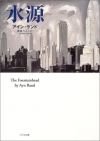
『肩をすくめるアトラス』は、1957年のアイン・ランドの4作目の小説である。ランドの最長にして最後の小説であり、ランドのフィクション作品の最高傑作と見なされている。サイエンス・フィクション、ミステリ、および恋愛小説の要素を含んでおり、自身の思想「客観主義」について、ランドのフィクション作品の中では最も詳しく述べている。 …

『肩をすくめるアトラス』は、1957年のアイン・ランドの4作目の小説である。ランドの最長にして最後の小説であり、ランドのフィクション作品の最高傑作と見なされている。サイエンス・フィクション、ミステリ、および恋愛小説の要素を含んでおり、自身の思想「客観主義」について、ランドのフィクション作品の中では最も詳しく述べている。 …

『肩をすくめるアトラス』は、1957年のアイン・ランドの4作目の小説である。ランドの最長にして最後の小説であり、ランドのフィクション作品の最高傑作と見なされている。サイエンス・フィクション、ミステリ、および恋愛小説の要素を含んでおり、自身の思想「客観主義」について、ランドのフィクション作品の中では最も詳しく述べている。 …

『肩をすくめるアトラス』は、1957年のアイン・ランドの4作目の小説である。ランドの最長にして最後の小説であり、ランドのフィクション作品の最高傑作と見なされている。サイエンス・フィクション、ミステリ、および恋愛小説の要素を含んでおり、自身の思想「客観主義」について、ランドのフィクション作品の中では最も詳しく述べている。 …

We the Living is the debut novel of the Russian-American novelist Ayn Rand. It is a story of life in post-revolutionary Russia and was Rand's first statement against communism. Rand observes in the foreword that We the Living was the closest she would ever come to writing an autobiography. Rand finished writing the …

Published together for the first time are three of Ayn Rand's most compelling stage plays. The courtroom drama Night of January 16th, famous for its open-ended verdict, is presented here in its definitive text. Also included are two of Rand's unproduced plays, Think Twice, a clever philosophical murder mystery, and …

 English
English Español
Español Deutsch
Deutsch



